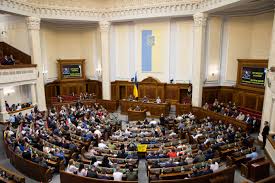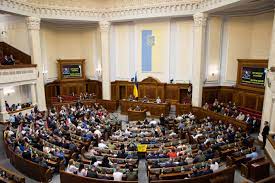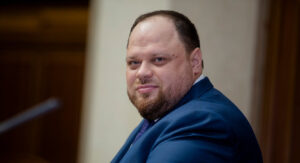
The Verkhovna Rada of Ukraine has adopted as a basis the bill №9083, providing for deregulation and detenization of the market of trade in used vehicles, said the head of the Verkhovna Rada Committee on Finance, Tax and Customs Policy Daniil Hetmantsev.
“Verkhovna Rada adopted as a basis the bill №9083 the initiator of which I am,” he wrote in his Telegram channel on Tuesday.
Getmantsev recalled that the market of used cars before the war was 1.7 million cars per year, in 2023 – 780 thousand.
“This year we expect 1.5 million and only 2.5% of this is sold in white. From the sale of a car in the “white” the state receives an average of 19.8 thousand UAH. From the sale in the “black” – 0″, – he wrote.
At the same time, the head of the parliamentary Committee reminds that for the work of the “white” market there is a hindrance – the requirement of additional registration of the car on the intermediary “with a bunch of unnecessary certificates”.
“The abolition of meaningless state registration of used cars by the trading organization on itself, even if it buys them as goods for resale – will be a pledge for the withdrawal of the market from the shadow, the expansion of the activities of “white” auto traders and the elimination of schemes by which the budget underpays taxes,” – commented the bill Getmantsev.
As reported, the bill № 9063 on the abolition of state registration of used cars on trade organizations that buy them as a commodity for further sale, registered in the Rada on March 6, 2023.
Among its co-authors are Hetmantsev, MPs Yaroslav Zheleznyak (Golos faction), Maryana Bezuglaya, Yevhen Bragar (“Servant of the People”), Dmytro Razumkov (non-faction).
Official car importers and dealers noted that deregulation of the used car trade market will not lead to an increase in prices, as the official market dictates prices and no one will pay more than a car costs.

The Verkhovna Rada has legalized medical cannabis and made it possible to use medical preparations containing cannabis (Cannabis) for the treatment of cancer and post-traumatic stress disorder. For the bill № 7457 on regulating the circulation of plants of the genus of hemp (Cannabis) for medical, industrial purposes, scientific and scientific-technical activities to create conditions for expanding access to patients to the necessary treatment of cancer and post-traumatic stress disorder, received as a result of wars, voted as a whole 248 people’s deputies at the plenary session of the Verkhovna Rada on Thursday.
The bill creates regulatory conditions for the legal limited circulation and use of cannabis, its resin, extracts and tinctures for medical, industrial purposes, scientific and scientific-technical activities.
The law comes into force six months after its promulgation.

Chairman of the Verkhovna Rada of Ukraine Ruslan Stefanchuk will be on a working visit to the Republic of Latvia on July 9-10, according to the press service of the Ukrainian parliament.
“The main purpose of the visit is to achieve international consensus on Ukraine’s path to NATO on the eve of the Vilnius summit of the Alliance, to strengthen assistance to Ukraine in countering the aggressor, support on the path of European integration,” the report said.
In Riga Stefanchuk will take part in the Summit of the heads of the parliaments of Latvia, Lithuania, Estonia, the Sejm of the Republic of Poland and Ukraine. This meeting will be the last high-level parliamentary event ahead of the NATO summit, which will be held July 11 in Vilnius.
The visit also includes meetings with newly elected Latvian President Edgars Rinkevics, former President Egils Levits, and talks with Latvian Saeima Speaker Edvards Smiltens and Prime Minister Krisjanis Karins.

Verkhovna Rada adopted a law № 8401, an important structural beacon of the program with the IMF, on the abolition of the 2% flat tax (UT) from August 1 and the return of documentary checks and EDB control, said first deputy head of the specialized Committee of the Rada Yaroslav Zheleznyak.
He said in Telegram that 239 people’s deputies voted for the law in its entirety.
According to him, the law stipulates that the payer of the 2% UT will be entitled to submit an application for waiver of the 2% UT and to indicate the tax system he wishes to switch to. Without such a statement, as well as if the payer does not specify the desired system in the application, he will automatically be returned to the system on which he was before the election of the 2% UT.
Also automatically will be considered as payers of UT of the third group with a rate of 5% newly formed business entities, which from the date of state registration chose the 2% UT.
As indicated by Zheleznyak, the law automatically restores the rights and obligations of a VAT payer for those entities whose registration was suspended as a VAT payer, and gives taxpayers who switched from 2% UT to a common system in 2023, the right to switch again in 2023 to a simplified system of their choice by submitting an application. In this case, if the application is filed before September 1, 2023, such a taxpayer will be considered a payer of UT from August 1, 2023.
The bill repeals the current moratorium on inspections of excisable goods (alcohol, tobacco, fuel), gambling and financial services from August 1, the deputy also said.
At the same time, he said, on October 1, responsibility for violations in the use of EDR is returned. An exception was retained only for front-line territories, but not for trade of excisable goods.
Zheleznyak said that the “technical debt” (arising from April 1, 2022 to July 31, 2023 in the electronic cabinet) will not be taken into account in determining the ability of the taxpayer to continue to stay on the simplified system.
The final version of the adopted law, said the deputy, provides for the right to voluntary payment of UT and UTII for the front-line territories (including areas of possible hostilities) and the opportunity for sole proprietors of UT without VAT to indicate the names of goods (services) in the calculation documents in the simplified form.
There is also a rule that for the transfer of goods by legal entities for the defense forces there is no need for the approved list of the CMU, added Zheleznyak.
As clarified by the head of the Finance Committee of the VR Daniel Getmantsev, the bill from August 1, partly repealed the current moratorium on inspections for excisable goods (alcohol, tobacco, fuel), gambling and financial services, and the end of martial law, if the payer pays the amount assessed by the inspection taxes or ERW within 30 days – he is exempt from penalties and fines accrued on that amount.
The head of the committee said that there is a moratorium on documentary inspections for payment of ERUs from August 1, 2023 until the end of martial law.
At the same time, taxpayers are exempted from liability for violations in payment of ERUs, committed from the beginning of martial law and until August 1, 2023, and taxpayers in the frontline territories (including areas of possible hostilities) will not be taken to repay the tax debt.
Hetmantsev added that the “technical debt” (which occurred from April 1, 2022 to July 31, 2023 in the electronic cabinet) will not be taken into account in determining the ability of the taxpayer to continue to stay on the simplified system.
The final version of the adopted draft law provides for preserving the right to voluntary payment of the single tax and ERU for front-line territories (including areas of possible hostilities) and enabling single tax payers without VAT to indicate the names of goods (services) in the calculation documents under the simplified system.
As previously reported, the Rada adopted the draft law № 8401 in the first reading on the eve of the IMF mission on the first review of the EFF – May 29. Then it was supported by the minimum required number of deputies – 226. Within the framework of the EFF program with the IMF it was supposed to come into force on July 1, but because of the delay in its consideration the Rada finance committee proposed to postpone its entry into force until August 1.
After working through almost two thousand amendments a week earlier, the Committee recommended MPs to support the bill as a whole, the first time softening the criteria for selecting companies for documentary checks.
The IMF representatives said on June 29, after the second tranche of $890 million was disbursed to Ukraine, that the Fund had agreed to postpone the implementation of this structural beacon for a month, but it remains one of the key ones in the program.

The Verkhovna Rada supported in the second reading and as a whole the bill No. 5762 on simplification of conditions for the production of distillates by small business entities, the head of the parliamentary committee on finance, tax and customs policy Daniel Getmantsev said.
“The law should bring the current legislation in the sphere of production and circulation of alcoholic beverages and distillates in line with EU requirements, as well as relax the regulation in this sphere for small business entities,” he wrote in Telegram on Thursday.
In the law ¹ 5762 “On amendments to the TCU and some laws of Ukraine on the simplification of the conditions of production of distillates by small business entities” the definition of small producers of distillates and requirements for their material and technical base are presented.
Small manufacturers of distillates are allowed to report on the volume of products manufactured and sold quarterly (instead of monthly), as well as reduced fines for failure or incorrect submission of such reports from 17 500 to 1 020 UAH.
The document reduced the cost of licenses for wholesale of alcoholic beverages for small producers of distillates from 500 thousand UAH to 30 thousand UAH, it is also allowed to use all alcoholic distillates, derived from agricultural products for the production of alcoholic beverages.
The law cancels the mandatory certification of alcohol, distillates, bioethanol, alcoholic beverages, explained the head of the financial parliamentary committee.

Ukrainian President Vladimir Zelensky has submitted a bill to the Verkhovna Rada, which defines English as the language of international communication in Ukraine, and also promotes the study of English by Ukrainian citizens.
The corresponding bill, No. 9432, was sent to the Verkhovna Rada committee on Wednesday for consideration.
According to a comment by deputy chairman of the Humanitarian Policy Committee Yevgeniya Kravchuk, the bill also defines categories of positions for which candidates are required to speak English.
“In order to occupy a position, civil servants, prosecutors, persons in senior positions in the police will be required to pass an examination in English,” – said in a message published in the Telegram channel of the Verkhovna Rada.
In particular, emergency units will have to provide assistance to foreigners and persons who do not speak the state language, in English. In addition, medical professionals must also be able to provide assistance in English or with the help of an interpreter.
Under the bill, information in transportation must be dubbed in English; foreign films whose original language is English must be shown in theaters in their original language with subtitles in the state language.
In turn, the commander of the United Forces of the AFU Lieutenant General Sergei Naev said that Zelensky’s initiative to submit this bill to parliament is “very timely.”
“At the moment, servicemen of the Ukrainian Armed Forces are undergoing training in a number of European countries, participating in military maneuvers in the UK. The other day the Sea Breeze series of exercises started, in which the personnel and ship personnel of the Ukrainian Armed Forces Navy are involved. A total of 24,000 Ukrainian servicemen have already been trained in EU countries,” said a statement published in the Telegram channel on Wednesday.
Naev noted that almost all technical documentation of weapons and military equipment supplied to Ukraine by partner countries is in English.
“I believe that if before the issue of military personnel learning English was a recommendation, now it should be enshrined at the legislative level,” the commander stressed.